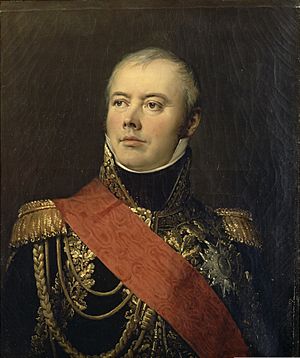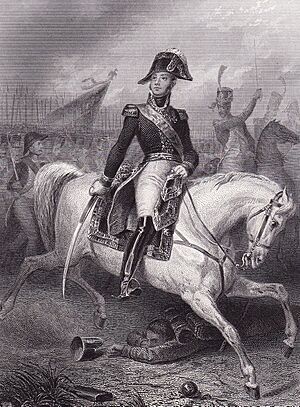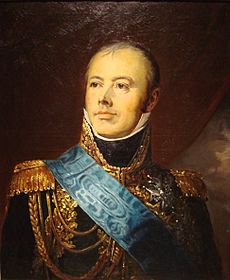Étienne Macdonald facts for kids
Quick facts for kids
Marshal of the Empire
Étienne Macdonald
Duke of Taranto
|
|
|---|---|

Portrait by Antoine-Jean Gros
|
|
| Born | 17 November 1765 Sedan, France |
| Died | 25 September 1840 (aged 74) Beaulieu-sur-Loire, France |
| Allegiance | |
| Service/ |
Army |
| Years of service | 1785–1830 |
| Rank | Marshal of the Empire |
| Battles/wars | French Revolutionary Wars
|
| Awards | Grand Cross of the Legion of Honour |
| Other work | Chancellor of the Legion of Honour |
| Signature | |
Étienne Jacques-Joseph-Alexandre Macdonald (born November 17, 1765 – died September 25, 1840) was an important military leader in France. He became a Marshal of the Empire, which was a very high rank in the French army. Macdonald fought in the French Revolutionary Wars and the Napoleonic Wars.
Contents
Early Life and Family Roots
Étienne Macdonald was born in Sedan, France. His father, Neil MacEachen, was from a Scottish family. They were called Jacobites, meaning they supported the old royal family of Scotland.
His family came from a place called South Uist in Scotland. Étienne was also related to Flora MacDonald. She was famous for helping Prince Charles Edward Stuart escape after a rebellion in 1745.
Joining the Army and Early Successes
In 1784, Macdonald joined the Irish Legion, a military group. He became a lieutenant in 1785. Later, he joined Dillon's Regiment.
When the French Revolution began, Macdonald supported the revolutionaries. He was promoted to captain in 1792. Soon after, he became an aide to General Charles François Dumouriez.
Macdonald showed great bravery at the Battle of Jemappes. Because of his actions, he was promoted to lieutenant colonel and then colonel in 1793.
He refused to join General Dumouriez when he left the French army. As a reward, Macdonald became a brigadier general in 1793. He helped lead the French invasion of the Netherlands. Macdonald's knowledge of the area was very helpful. He played a key role in capturing the Dutch fleet in 1795.
In 1797, he became a general of division. He served in the Army of the Rhine and later in the Army of Italy.
Campaigns in Italy
In 1798, Macdonald arrived in Italy. He helped occupy Rome and became its governor. He also fought against General Mack in several battles, including Battle of Civita Castellana.
Macdonald and General Championnet worked together. They conquered the Kingdom of Naples, which then became known as the Parthenopaean Republic.
However, in 1799, Russian General Alexander Suvorov invaded northern Italy. Suvorov defeated the French armies. Macdonald led his army of 36,000 men north. He attacked Suvorov's army at the Trebbia. After three days of intense fighting, Macdonald's army was defeated. He had to retreat.
Later, he became governor of Versailles. He was involved in the events of the 18 Brumaire, which brought Napoleon Bonaparte to power.
Crossing the Alps and Napoleon's Dislike
In 1800, Macdonald commanded the army in Switzerland. He kept communication lines open between the French armies in Germany and Italy.
In the winter of 1800–01, he led his army over the Splügen Pass in the Alps. This was a very difficult journey through snow and ice. It was seen as a great achievement, similar to Napoleon's own famous crossing of the Great St Bernard Pass.
When he returned to Paris, Macdonald married the widow of General Joubert. He was then appointed French ambassador to Denmark. However, Napoleon did not like Macdonald because he was friends with another general, Moreau. Because of this, Napoleon did not make Macdonald a marshal at first. He also did not give him a military command between 1803 and 1809.
Serving Under Napoleon

Macdonald did not have a job in the army until 1809. Then, Napoleon made him a military adviser to Prince Eugène de Beauharnais, who was the viceroy of Italy.
At the Battle of Wagram in 1809, the French army was under great pressure. Napoleon ordered Macdonald to launch a desperate counterattack. Macdonald quickly formed a huge infantry square, protected by cavalry. He led this attack against the Austrian lines. Even though his troops suffered many losses, this brave attack broke the Austrian center and helped win the battle.
After the battle, Napoleon found Macdonald on the battlefield. He told him, "You have behaved valiantly... I make you a Marshal of France. You have long deserved it." Napoleon also made him the Duke of Taranto.
In 1810, Macdonald served in Spain. In 1812, he commanded the left side of the Grande Armée during the invasion of Russia. He was sent north but did not succeed in capturing Riga.
In 1813, he fought in the battles of Lützen and Bautzen. He was then ordered to invade Silesia, where General Gebhard Leberecht von Blücher defeated him at Katzbach.
At the Battle of Leipzig in 1813, Macdonald's troops fought bravely. He tried to flank the Austrian army. After the battle, he was ordered to help evacuate Leipzig. He managed to swim across the Elster River, but Prince Poniatowski drowned.
During the defensive campaign of 1814, Macdonald again showed his bravery. He was one of the marshals sent by Napoleon to announce his abdication in Paris. While many others left Napoleon, Macdonald remained loyal. Napoleon told him to support the new government. Macdonald was given a special sword for his loyalty.
Life After Napoleon
When the Bourbon monarchy was restored in France, Macdonald was made a peer of France. He also received the Grand Cross of the royal order of St. Louis. He remained loyal to the new king during the Hundred Days, when Napoleon briefly returned to power.
In 1815, he became the chancellor of the Legion of Honour, a position he held until 1831. He also participated in the debates of the Chamber of Peers. He was known for speaking his mind. King Louis XVIII even gave him the nickname "His Outspokenness."
From 1830, Macdonald lived a quiet life at his country home in Beaulieu-sur-Loire. He passed away there on September 25, 1840, at the age of 74.
Personal Life and Family
Macdonald was married three times and had four children.
- With his first wife, Marie-Constance Soral de Montloisir (married 1791, died 1797), he had two daughters:
- Anne-Charlotte Macdonald (1792–1870)
- Adele-Elisabeth Macdonald (1794–1822)
- With his second wife, Felicité-Françoise de Montholon (married 1802, died 1804), he had one daughter:
- Alexandrine-Aimee Macdonald (1803–1869)
- With his third wife, Ernestine-Therese de Bourgoing (married 1821, died 1825), he had one son:
- Louis-Marie Macdonald, 2nd Duke of Taranto (1824–1881)
Scottish Connection
In 2010, a special plaque was put up in memory of Marshal Jacques Macdonald. It is on the island of South Uist in Scotland. This is where Macdonald's family came from. Macdonald himself visited South Uist in 1825 to learn more about his family history.
How He is Remembered
Historians have different opinions about Macdonald's military skills. Some say he was an excellent commander with great military insight. Others point to his defeats. However, many agree that he was a brave and loyal soldier who served France through many important wars.
See also
 In Spanish: Etienne Jacques Joseph MacDonald para niños
In Spanish: Etienne Jacques Joseph MacDonald para niños
 | Delilah Pierce |
 | Gordon Parks |
 | Augusta Savage |
 | Charles Ethan Porter |


